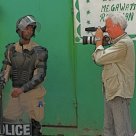WATCH ABOVE: 16×9’s “Not Wanted in Canada.”

It reads like a message smuggled out of the Gulag.
“Thousands of lives are wasting away inside prison cells; many are separated from their families and loved ones merely for being born elsewhere.”
It’s not the Gulag. It’s Canada, as seen in a 2014 report by a group called No One is Illegal—activists who are highly critical of the government’s policy on immigrant detention.
The report also carries a 2012 quote from Jason Kenney, former federal immigration minister. “Anyone can leave immigration detention any time they want—they just have to leave Canada.”
Two extreme viewpoints on a controversial topic—how Canada deals with illegal migrants, or “inadmissibles” as they are known. And as is so often the case, the reality is somewhere in the middle, as seen in this week’s 16×9 story about Michael Mvogo and Deepan Budlakoti, called Not Wanted in Canada.
Michael, an African man in his mid-50s, is not exactly wasting away, and he’s one of hundreds, not thousands, being detained in a cell. He has, however, been locked up for 8 ½ years, in conditions he calls “horrible,” because the Canada Border Services Agency (CBSA) is not convinced his real name is Michael Mvogo, nor that his native country is Cameroon. (And Cameroon doesn’t want him.)
As of mid-January, 66 other “inadmissibles” have been detained for longer than a year. One man has been in custody for 10 years.
Michael can’t “just…leave Canada” anytime he wants. There are cells, guards and walls to make sure he doesn’t, at least until authorities are satisfied that he is who he says he is, and another country will accept him. Until then, he’s an unwilling guest of the Canadian taxpayer, at a cost of $239 a day.
His immigration adviser (and a United Nations working group) say it would be much cheaper, more sensible and far more compassionate to release him until the CBSA can confirm his identity, and his destination country. But immigration authorities are not inclined to do that, because there are fears he would not show up when they want him.
WATCH BELOW: An extended interview with MacDonald Scott, immigration consultant for Michael Mvogo.
In any event, Michael doesn’t appear to be much of a threat: His original crime was possession of $10 worth of cocaine, and carrying a bogus U.S. passport. But he’s been in a jail cell for eight and a half years. (That’s longer than some people convicted of homicide.) From his prison cell, Michael told 16×9 that Canada is behaving worse than a Third World country.
Deepan Budlakoti, on the other hand, is not “detained” at all. But he considers himself in indefinite detention anyway, because his passport was revoked, he can’t travel, he can’t vote, and he can only work with a special permit.
Michael’s crime was a minor one. Deepan has larger issues with the law. As a kid he was nabbed for break-ins, and when he grew up he sold a rifle and some drugs to an undercover cop. He served his time in prison. But when he got out, the Citizenship and Immigration people nailed him on a little-known technicality—they say he was born while his parents were working for the Indian High Commission in Ottawa, and that, under the Citizenship Act, makes him a citizen of India (India disagrees). They took away his Canadian citizenship, and all of his rights as a citizen, and he’s been fighting ever since to get them back.
Meanwhile, Deepan became something of a poster child for critics, such as Amnesty International, who say the government is getting much too heavy-handed with its immigration policy.
Audrey Macklin, a professor and chair of human rights law at the University of Toronto, says the government’s handling of the Budlakoti case “speaks to the kind of vindictiveness and targeting of people that all Canadians should be concerned about.”
The Canadian government disagrees. “Citizenship is a privilege, not a right,” a spokesman from Citizenship and Immigration told me. He referred to Deepan’s “extensive criminal record” and said recent reforms to the Citizenship Act “strengthen the value of citizenship while protecting the system from abuse.” Besides, he said, Deepan was never “entitled” to Canadian citizenship.
Both men are using a very Canadian right, the tools of democracy, to appeal. Deepan has several legal challenges in place to restore his rights and his citizenship, and Michael’s lawyers have monthly detention reviews to make their case that he be released.
For all that, they remain on the outside, looking in.
UPDATE AUGUST 27, 2015: Michael Mvogo was deported to Cameroon this week after CBSA confirmed his name and his country of origin.
16×9’s “Not Wanted in Canada” airs Saturday at 7pm.


Comments